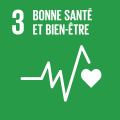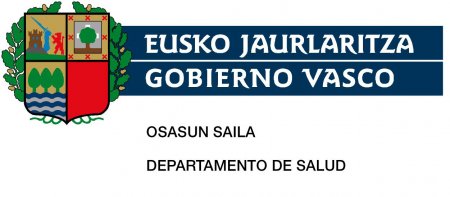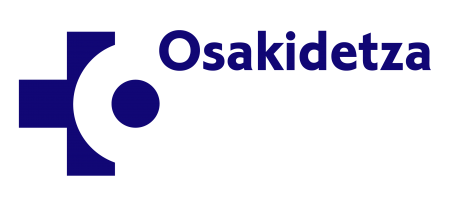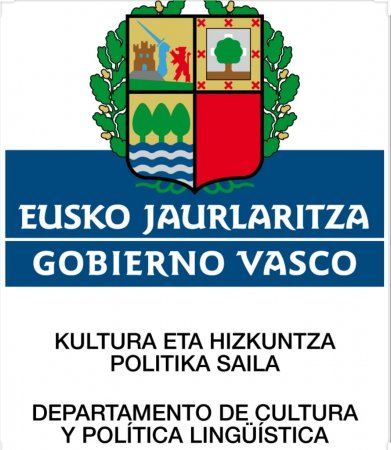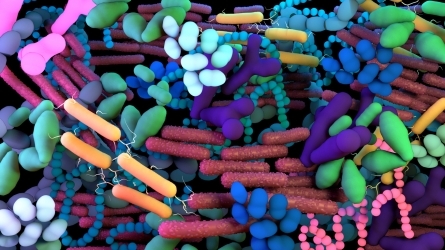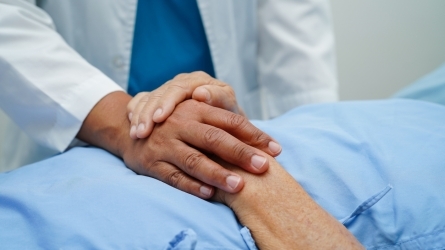
Cuidados paliativos pediátricos y de adultos: un derecho tan desconocido
El objetivo de este Curso de Verano es difundir el conocimiento sobre los cuidados paliativos en la sociedad y dar a conocer nuestro derecho como ciudadanas y ciudadanos.
Description
Los cuidados paliativos nos demuestran que podemos cuidar cuando no se puede curar. Que incluso cuando la vida misma corre un peligro de muerte, podemos fortalecerla y cuidarla. Los cuidados paliativos, en momentos tan duros por los que nadie quiere pasar, nos ofrecen protección, capacidad para responder a diferentes tipos de dolor y necesidades, y una gran profesionalidad.
Pero este derecho que se nos ofrece por ley, es muy desconocido para la ciudadanía. También es a menudo desconocida en la formación de profesionales sanitarios y en las organizaciones sanitarias. Y si atendemos al cuidado infantil, los cuidados paliativos pediátricos aún están por desarrollar en la Comunidad Autónoma del País Vasco. Estamos convencidas y convencidos que el desarrollo de cuidados paliativos nos fortalecerá y humanizará como sociedad, evitando muchos sufrimientos evitables.
El objetivo de este Curso de Verano es difundir el conocimiento sobre los cuidados paliativos en la sociedad y dar a conocer nuestro derecho como ciudadanas y ciudadanos. Se reunirán las experiencias de personas que han podido conocer el servicio de los cuidados paliativos, tanto en la infancia como en la edad adulta, con el conocimiento de profesionales expertos en cuidados paliativos. Y a través de todos estos puntos de vista, se informará de los beneficios que traerá el desarrollo de los cuidados paliativos.
Objectives
Difundir los derechos que tiene la ciudadanía a recibir cuidados paliativos.
Informar sobre la necesidad de prestación de cuidados paliativos infantiles.
Reflexionar sobre la estructura organizativa territorial de los cuidados paliativos.
Activity directed to
- All public
- University student
- Professionals
In collaboration with
Program
30-06-2025
Harrera
Presentation by the Director of the activity
- Nere Erkiaga Laka | Hil Argi Elkartea - Zuzendaria
Round table: “Herritarren esperientziatik: Haurrek zaintza aringarriak jasotzeko duten eskubidea“
- Nere Erkiaga Laka | Hil Argi Elkartea - Moderatzailea (Moderator)
- Amaia Madariaga Zabala | Herritarra
- Bittor Asteinza Blanco
Break
“¿Cómo funciona la Unidad de Atención Domiciliaria Pediátrica y Cuidados Paliativos Pediátricos de Cruces?“
- Jesus Sánchez Etxaniz | Hospital Universitario de Cruces. Osakidetza - Responsable de la Unidad de Hospitalización a Domicilio y Cuidados Paliativos Pediátricos
“¿Qué organización mínima sería necesaria para un servicio de cuidados paliativos pediátricos de calidad en la CAV?"“
- Iñigo de Noriega Echevarria | Hospital Infantil Universitario Niño Jesús. Madrid - Miembro del Equipo médico de la Unidad de Cuidados Paliativos Pediátricos
Round table: “La necesidad de un servicio autonómico de cuidados paliativos pediátricos“
- Julio Gómez Cañedo (Moderator)
- Jesus Sánchez Etxaniz | Hospital Universitario de Cruces. Osakidetza - Responsable de la Unidad de Hospitalización a Domicilio y Cuidados Paliativos Pediátricos
- Iñigo de Noriega Echevarria | Hospital Infantil Universitario Niño Jesús. Madrid - Miembro del Equipo médico de la Unidad de Cuidados Paliativos Pediátricos
- Nere Erkiaga Laka | Hil Argi Elkartea - Zuzendaria
01-07-2025
Presentation by the Director of the activity
- Nere Erkiaga Laka | Hil Argi Elkartea - Zuzendaria
Round table: “Herritarren esperientziatik: Herritarrek zaintza aringarriak jasotzeko duten eskubidea“
- Nere Erkiaga Laka | Hil Argi Elkartea - Moderatzailea (Moderator)
- Nerea Ortiz Larrinaga | Zaintza aringarrien zerbitzua ezagutu duen herritarra
- Leire Markuerkiaga Olabe | Zaintza aringarrien zerbitzua ezagutu duen herritarra
Break
“Debagoienako OSIa: Nola lan egiten du hiriburuetatik kanpoko zaintza aringarrietako zerbitzu batek?“
- Iñaki Peña Bandrés | Arrasateko Ospitaleko Zaintza Aringarrietako Unitatea - Arduraduna
“¿Qué organización mínima sería necesaria para un servicio de cuidados paliativos de calidad en la CAV?“
- Alberto Meléndez Gracia | Unidad de Cuidados Paliativos del Hospital Txagorritxu - Responsable
Round table: “La situación de los cuidados paliativos en la Comunidad Autónoma Vasca“
- Naomí Hasson | Arinduz Euskadiko Zaintza Aringarrien Elkartea Lehendakaria / Presidenta de Arinduz Sociedad de Cuidados Paliativos de Euskadi (Moderator)
- Iñaki Peña Bandrés | Arrasateko Ospitaleko Zaintza Aringarrietako Unitatea - Arduraduna
- Alberto Meléndez Gracia | Unidad de Cuidados Paliativos del Hospital Txagorritxu - Responsable
- Nere Erkiaga Laka | Hil Argi Elkartea - Zuzendaria
Directors
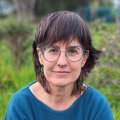
Nere Erkiaga Laka
Hil Argi Elkartea
Master in Death Studies at the University of La Laguna (2017), Master in Community Development and Participation at the University of the Basque Country (2007) and Postgraduate in Transmission of Basque Culture (2011) at Mondragon Unibertsitatea. She has experience in group dynamization and in death issues dissemination, and has launched the Hil Arte Bizi project for the empowerment of citizens and communities to face death. In 2018 she promoted the creation of the Hil Argi Elkartea association. This association offers, among other projects, “Gehiago Gara” initiative and “Bertso-ipuin bat zuretzat” for children who need palliative care. During the 2020-2021 academic year she collaborated in the Euskadi Irratia’s Faktoria radio program and created 41 chapters on topics related to death: https://hilargi.eus/irratian/
Speakers

Bittor Asteinza Blanco
He has experienced palliative care service as a father. He will share his experience hoping to be helpful to other people and in order to make this right known in society.
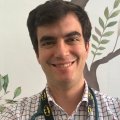
Iñigo de Noriega Echevarria
Pediatrician specialized in pediatric palliative care at the Niño Jesús University Hospital in Madrid, with a special interest and experience in pediatric cancer patients. He earned a Bachelor's degree in Medicine from the Autonomous University of Madrid (UAM), a Master's degree in Pediatric Palliative Care from the International University of La Rioja (UNIR), and a Diploma in Statistics in Health Sciences from the Autonomous University of Barcelona (UAB). He is also Academic Coordinator of the Master's Degree in Pediatric Palliative Care at the International University of La Rioja (UNIR). He has participated in the development of numerous articles and scientific publications related to pediatric palliative care and provides university training on Comprehensive Care in Pediatric Palliative Care and Evidence-Based Practice.

Nere Erkiaga Laka
Hil Argi Elkartea
Master in Death Studies at the University of La Laguna (2017), Master in Community Development and Participation at the University of the Basque Country (2007) and Postgraduate in Transmission of Basque Culture (2011) at Mondragon Unibertsitatea. She has experience in group dynamization and in death issues dissemination, and has launched the Hil Arte Bizi project for the empowerment of citizens and communities to face death. In 2018 she promoted the creation of the Hil Argi Elkartea association. This association offers, among other projects, “Gehiago Gara” initiative and “Bertso-ipuin bat zuretzat” for children who need palliative care. During the 2020-2021 academic year she collaborated in the Euskadi Irratia’s Faktoria radio program and created 41 chapters on topics related to death: https://hilargi.eus/irratian/

Julio Gómez Cañedo
Licenciado en Medicina y Cirugía por la UPV/EHU. Coordinador de proyectos sanitarios y de desarrollo en los barrios urbano marginales de la ciudad de Quito (Ecuador) desde 1996 a 2001. Master en Medicina Paliativa . Desde 2003 médico responsable del equipo de cuidados paliativos domiciliario del hospital San Juan de Dios de Santurce, desde 2008 Director del Equipo de atención Psicosocial y desde 2016 Coordinador del Servicio de Cuidados Paliativos del hospital. Profesor endiferentes master y post grados en relación a los cuidados del final de la vida

Naomí Hasson
Naomi is a Master's Nurse in palliative care and a Master's in grief, loss, and trauma. She has worked in many palliative care-related sectors and in different countries, including Saint Joseph's Hospice in London. She currently leads Project Lead, Getxo Zurekin, the Compassionate Community of the Basque Country, working with the DobleSonrisa Foundation. She is President of Arinduz and coordinator of the citizen and professional platform Echamos de Menos (We Miss).

Amaia Madariaga Zabala
She has experienced palliative care service as a mother. She will share her experience hoping to be helpful to other people and in order to make this right known in society.

Leire Markuerkiaga Olabe
She has experienced palliative care service as a couple. She will share her experience hoping to be helpful to other people and in order to make this right known in society.

Alberto Meléndez Gracia
He is specialized in family and community medicine. He holds a Master's degree in palliative medicine. He collaborates as a professor in the Master's in Palliative Care offered by the University of Basque Country (UPV) in conjunction with the Hospital San Juan de Dios of Santurtzi. He is an assistant professor in the Palliative Care course at the Faculty of Medicine of the University of Navarra. He works as a physician in the Palliative Medicine Team at the OSI. Araba; his current work focuses on supporting his colleagues in Primary Care at the OSI in providing home care to patients and families in need of Palliative Care. He was president of Arinduz – the Palliative Care Society of Euskadi from 2010 to 2023 and vice-president of the Spanish Palliative Care Society (SECPAL) from 2016 to 2021. In 2020, together with other colleagues and friends, he created the "Babespean" association, which seeks to promote and enhance care for the most vulnerable people, both within the family and in the community.

Nerea Ortiz Larrinaga
She has experienced palliative care service as a daughter. She will share her experience hoping to be helpful to other people and in order to make this right known in society.
I began working in Palliative Care in 2010 at the Debagoiena Hospital (Arrasate-Mondragón). I worked in Home Hospitalization from 2012-2013 in Cruces and from 2014-2015 at the Goierri-Urola Garaia Hospital (Zumarraga). I was a member of the board of directors of Arinduz / the Basque Palliative Care Society. Within the international network of compassionate communities, I am a member of the initiative "Zarautz, Herri Zaintzailea". Screenwriter and director on the documentaries "Aulki Hutsak" ("Empty chairs") and "Mendian hil. Hirian hil" ("Dying on the mountain. Dying in the city") and on the play about grief and violence "S(u/a)minetik bakera" ("From bitter wrath to peace"). Master's degree in Palliative Care (UVic-ICO).

Jesus Sánchez Etxaniz
Pediatrician specializing in pediatric palliative care and head of the Home Hospitalization and Pediatric Palliative Care Unit at Cruces University Hospital. He teaches on the Master's Degree in Pediatric Palliative Care at the International University of La Rioja (UNIR), the University-Specific Master's Degree in Comprehensive Palliative Care at the University of the Basque Country (EHU/UPV), and the Master's Degree in Early Intervention, Home Care, and Palliative Care at the University of the Basque Country (EHU/UPV). He is a member of the Development Group and the Advisory Committee of the Basque Country Palliative Care Plan 2023-2027, developed by the Department of Health of the Basque Government.
Registration fees
| Face-to-face | Until 01-07-2025 |
|---|---|
| 87,00 EUR | |
| 74,00 EUR | |
| 61,00 EUR | |
| 25,00 EUR | |
| 74,00 EUR | |
| 74,00 EUR | |
| 22,00 EUR |
Venue
Miramar Palace
Pº de Miraconcha nº 48. Donostia / San Sebastián
Gipuzkoa
Miramar Palace
Pº de Miraconcha nº 48. Donostia / San Sebastián
Gipuzkoa
Sustainable development goals
Agenda 2030 is the new international development agenda approved in September 2015 by the United Nations. This agenda aims to be an instrument to favour sustainable human development all over the planet, and its main pillars are the eradication of poverty, a reduction in equality and vulnerability and fostering sustainability. It is a unique opportunity to transform the world up to 2030 and guarantee human rights for all.

3 - Good health and well-being
Guarantee a healthy life and foster the well-being of all people of all ages. Key issues: universal healthcare coverage, sexual and reproductive health, reduction in the number of road accident casualties, pollution and chemical products, reduction in maternal and neonatal mortality, the end of epidemics such as AIDS, combating hepatitis and other water-borne diseases, drug and alcohol prevention, control of tobacco.
More information